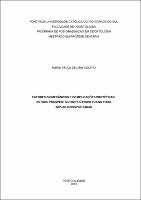| Share record |


|
Please use this identifier to cite or link to this item:
https://tede2.pucrs.br/tede2/handle/tede/6737| Document type: | Dissertação |
| Title: | Fatores biomecânicos e complicações protéticas : estudo prospectivo em próteses totais fixas implantossuportadas |
| Author: | Coltro, Maria Paula de Lima  |
| Advisor: | Shinkai, Rosemary Sadami Arai |
| Abstract (native): | Falhas em próteses totais fixas implantossuportadas (PTFIs) podem estar relacionadas com fatores biomecânicos e com a qualidade estrutural das próteses. O objetivo deste estudo de coorte prospectivo foi avaliar a influência de fatores biomecânicos e clínicos em falhas e complicações de PTFIs. Os dados foram coletados desde o momento da prova da infraestrutura metálica e aos 6, 12, 24 e 36 meses após a instalação da prótese, através de anamnese, exame físico e medições de força máxima de mordida, presença e intensidade de bruxismo, qualidade de vida (OHIP-14), distribuição dos contatos oclusais e avaliação do desenho da infraestrutura metálica. A análise estatística foi realizada de forma descritiva, por análise de sobrevida pelo método de Kaplan-Meier, análise multivariada através da regressão de Cox e teste-t pareado. A amostra de conveniência foi constituída por 69 pacientes que receberam 72 PTFIs em maxila e mandíbula e foram acompanhados por um período de até 47 meses (média de 23,1 meses). Treze PTFIs falharam (18%), ocorrendo avulsão ou fratura da faceta dentária acrílica. Os principais resultados foram: 1) alto índice de sucesso do tratamento com ocorrência de 18% de falhas recuperáveis nas próteses e sobrevida de 100% dos implantes em 36 meses; 2) não houve influência negativa de bruxismo ou de força de mordida elevada na ocorrência de falhas; 3) o desenho da infraestrutura metálica (retenções - altura inadequada dos pinos) foi o principal fator de risco para falhas. Não houve relação de falhas com sexo, índice de massa corporal, espessura de revestimento estético, tipo de arco antagonista ou arcada superior/inferior. Os resultados sugerem que há necessidade de uma maior padronização na confecção das infraestruturas metálicas, pois a altura inadequada dos pinos para retenção das facetas dentárias foi o principal achado relacionado às falhas nas próteses avaliadas. Este fator é passível de ser controlado no laboratório e na clínica, possibilitando intervenção profissional para redução de risco de falha e aumento da longevidade da prótese. Além disso, o ajuste oclusal deve ser observado, pois as falhas nas PTFIs parecem ocorrer mais frequentemente no lado mais sobrecarregado da arcada. |
| Abstract (english): | Failures in implant supported fixed complete dentures may be related to the biomechanical factors and structural quality of the prostheses. The aim of this prospective cohort study was to investigate the influence of the biomechanical and clinical factors on failures and complications observed in implant supported fixed complete dentures. The data were collected at baseline and 6, 12, 24 and 36 months after delivery of the definitive prostheses through anamneses, physical examination and measurements of maximal bite force, presence and intensity of the bruxism, quality of life (OHIP-14), distribution of the occlusal contacts and technical quality of the metallic framework. Statistical analysis was performed using the Kaplan-Meier survival analysis, multivariate analysis by a Cox regression model and a paired t-test. The convenience sample consisted of 69 patients rehabilitated with 72 fixed complete dentures with up to 47 months of follow-up. Thirteen fixed complete dentures failed (18%), occurring avulsion or fracture of the artificial denture teeth. The main results were; 1) high success index of the treatment with 100% implant survival rate in 36 months and occurrence of 18% of repairable failures in prostheses. 2) presence of bruxism or high maximal bite force do not negatively influence the occurrence of the failures. 3) the design of the metallic framework (insufficient height of the retentive pins) is the risk factor for the failures. No association was found between failures and gender, body mass index, thickness of the aesthetic coating, type of the antagonist arch or superior/inferior arch. The results suggest that a better standardization of metal framework construction is necessary, because insufficient height of the retentive pins of the denture teeth was the main factor related to the failures in evaluated prostheses. It is possible to control this factor in the laboratory and in the clinic to reduce the risk of failure and increase the longevity of the prostheses. Moreover, occlusal adjustments should be carefully observed, because the failures appear to occur more on the overloaded segment of the arch. |
| Keywords: | IMPLANTODONTIA PRÓTESE DENTÁRIA ODONTOLOGIA |
| CNPQ Knowledge Areas: | CIENCIAS DA SAUDE::ODONTOLOGIA |
| Language: | por |
| Country: | Brasil |
| Publisher: | Pontifícia Universidade Católica do Rio Grande do Sul |
| Institution Acronym: | PUCRS |
| Department: | Faculdade de Odontologia |
| Program: | Programa de Pós-Graduação em Odontologia |
| Access type: | Acesso Aberto |
| URI: | http://tede2.pucrs.br/tede2/handle/tede/6737 |
| Issue Date: | 29-Feb-2016 |
| Appears in Collections: | Programa de Pós-Graduação em Odontologia |
Files in This Item:
| File | Description | Size | Format | |
|---|---|---|---|---|
| DIS_MARIA_PAULA_DE_LIMA_COLTRO_COMPLETO.pdf | Texto Completo | 1.36 MB | Adobe PDF |  Download/Open Preview |
Items in DSpace are protected by copyright, with all rights reserved, unless otherwise indicated.




